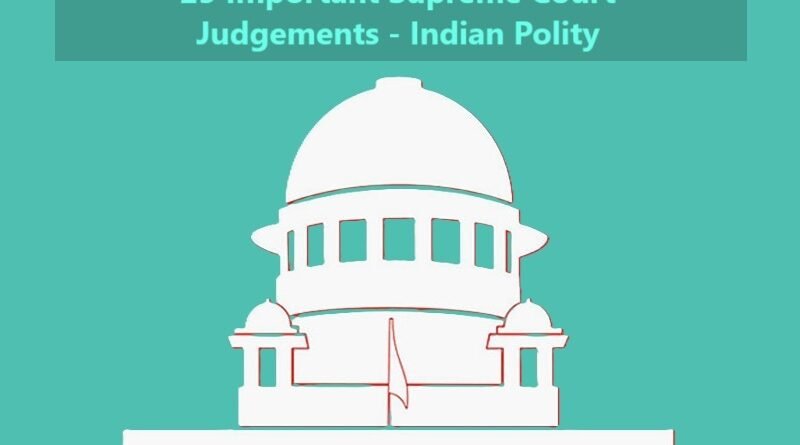25 Important Supreme Court Judgements – Indian Polity
The Supreme Court of India has delivered numerous landmark judgments that have significantly influenced the nation’s legal and constitutional framework. These decisions are crucial for aspirants preparing for the UPSC examination, as they highlight the evolving interpretation of the Constitution and the judiciary’s role in shaping Indian democracy. Below is a compilation of some of the most pivotal Supreme Court judgments:
1. Kesavananda Bharati v. State of Kerala (1973)
- Introduced the Basic Structure Doctrine of the Constitution, ensuring Parliament cannot alter its fundamental framework.
- Asserted limits on the power of constitutional amendments.
2. Maneka Gandhi v. Union of India (1978)
- Expanded Article 21 (Right to Life and Personal Liberty).
- Held that laws depriving personal liberty must be just, fair, and reasonable.
3. S.R. Bommai v. Union of India (1994)
- Defined the scope of Article 356 (President’s Rule).
- Reinforced the federal structure by subjecting the President’s Rule to judicial review.
4. Indra Sawhney v. Union of India (1992)
- Upheld the Mandal Commission report, approving 27% OBC reservations.
- Introduced the creamy layer concept to exclude affluent OBCs from reservation benefits.
5. Vishaka v. State of Rajasthan (1997)
- Established Vishaka Guidelines to address workplace sexual harassment.
- Laid the foundation for later laws like the Sexual Harassment of Women at Workplace Act (2013).
6. Navtej Singh Johar v. Union of India (2018)
- Decriminalized homosexuality by partially striking down Section 377 of the IPC.
- Affirmed LGBTQ+ rights and personal autonomy.
7. Justice K.S. Puttaswamy v. Union of India (2017)
- Declared the Right to Privacy as a fundamental right under Article 21.
- Influenced data protection laws and privacy debates in India.
8. Shayara Bano v. Union of India (2017)
- Declared Triple Talaq (instant divorce) unconstitutional.
- Advanced gender justice and equality in personal laws.
9. Olga Tellis v. Bombay Municipal Corporation (1985)
- Recognized the Right to Livelihood as part of Article 21.
- Ruled that evictions without rehabilitation violated fundamental rights.
10. Minerva Mills Ltd. v. Union of India (1980)
- Reaffirmed the Basic Structure Doctrine.
- Balanced Fundamental Rights and Directive Principles of State Policy (DPSPs).
11. I.R. Coelho v. State of Tamil Nadu (2007)
- Held that laws placed in the Ninth Schedule of the Constitution are subject to judicial review if they violate the basic structure.
12. ADM Jabalpur v. Shivkant Shukla (1976) – The Habeas Corpus Case
- Controversially upheld the suspension of fundamental rights during the Emergency.
- Later criticized and indirectly overruled by subsequent judgments.
13. Golaknath v. State of Punjab (1967)
- Limited Parliament’s power to amend Fundamental Rights under Article 368.
- Set the stage for the Kesavananda Bharati case.
14. M.C. Mehta v. Union of India (1987)
- Introduced the Polluter Pays Principle and Absolute Liability Doctrine in environmental jurisprudence.
- Focused on environmental protection and corporate accountability.
15. Kihoto Hollohan v. Zachillhu (1992)
- Upheld the constitutional validity of the Anti-Defection Law under the Tenth Schedule.
- Strengthened political stability by preventing party-switching by elected representatives.
16. Berubari Union Case (1960)
- Clarified that territorial cession requires a constitutional amendment under Article 368.
- Highlighted the procedure for altering India’s territorial boundaries.
17. Bandhua Mukti Morcha v. Union of India (1984)
- Addressed bonded labor and human rights violations.
- Expanded the scope of Public Interest Litigation (PIL).
18. T.M.A. Pai Foundation v. State of Karnataka (2002)
- Clarified the rights of minority institutions to establish and administer educational institutions.
19. Shreya Singhal v. Union of India (2015)
- Struck down Section 66A of the IT Act, which restricted free speech online.
- Reinforced the right to free expression under Article 19(1)(a).
20. Mohd. Ahmed Khan v. Shah Bano Begum (1985)
- Affirmed the right of a Muslim woman to maintenance under Section 125 of the CrPC.
- Sparked debates on secularism and personal laws.
21. Common Cause v. Union of India (2018)
- Legalized passive euthanasia and recognized the right to a dignified death.
- Allowed living wills for terminally ill patients.
22. Nandini Satpathy v. P.L. Dani (1978)
- Interpreted Article 20(3), affirming that no person can be compelled to be a witness against themselves.
- Strengthened the right against self-incrimination.
23. Joseph Shine v. Union of India (2018)
- Struck down Section 497 of the IPC, decriminalizing adultery.
- Reinforced gender equality and personal autonomy.
24. Secretary, Ministry of Information and Broadcasting v. Cricket Association of Bengal (1995)
- Declared airwaves a public property, ensuring equitable access.
- Paved the way for private broadcasting in India.
25. Naz Foundation v. Government of NCT of Delhi (2009)
- Initially decriminalized homosexuality under Section 377.
- Overturned by the Supreme Court in 2013 but reinstated later in the Navtej Singh Johar case.
These judgments underscore the evolving interpretation of the Indian Constitution and its impact on fundamental rights, social justice, and governance. For aspirants preparing for exams like UPSC, understanding these rulings is critical for grasping the judiciary’s pivotal role in shaping modern India.


Pingback: I.R. Coelho v. State of Tamil Nadu (2007): Judicial Review and the Ninth Schedule - Bharat Articles
Pingback: Landmark Judgments in India - Bharat Articles
Pingback: Landmark Judgments in India | HashStacks